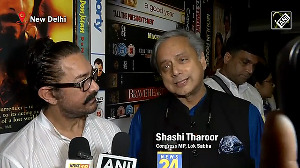The battle between music companies and FM radio channels over royalty payments has come out in the open with last-minute mediation by the Ministry of Information and Broadcasting (I&B) failing to break the deadlock.
Music companies, already fighting rampant piracy, are demanding a doubling of music royalty fees (from the current Rs 660 per hour of music played) that FM radio firms pay.
They have also demanded that radio channels treat sound recording rights and rights in musical lyrical works (tunes are copied by radio) as two separate sets of rights and playing them without a licence would amount to copyright infringement.
India's 250-plus FM radio stations across 90 towns, represented by the Association of Radio Operators in India (AROI), pay royalty to the Phonographic Performance Ltd (PPL), which represents 160 music companies like Saregama India, Sony BMG Music, Universal Music, Tips Industries, Venus Records & Tapes and others.
AROI said the current formula means that FM radio operators end up paying 15 to 50 per cent of their annual revenue as music royalty fees, significantly above global benchmarks of 2 to 3 per cent.
Overall, the industry earns annual revenues of Rs 550 crore of which about Rs 100 crore is paid as music royalty.
Sources said AROI may propose possible solutions like the royalty fee payment based on population of a city, genre of music played by the stations and fees based on 2 to 4 per cent of the annual revenue the stations generate.
"The I&B ministry wanted both sides to talk and reach some sort of an understanding on music royalty fees. But that did not happen," said Apurva Purohit, president, AROI, and CEO, Radio City 91.1 FM.
"Now the matter will be heard by the Copyright Board on January 28 where individual radio companies will present their case," she added.
The Rs 750-crore (Rs 7.50 billion) music industry is also demanding action against about 100 FM stations, saying they have gone on air without taking licences from the music societies or from the individual copyright owners, violating music copyrights.
"The music industry firmly believes that the government should not support such violators of copyrights and must take action to support the music industry survive in these difficult days," says a senior executive of Indian Music Industry (IMI).






